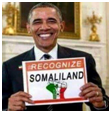|
THE RIGHT TO SELF-DETERMINATION OF THE
PEOPLE OF SOMALILAND



The right to self-determination, enshrined in the
Charter of the United Nations “UN” and int ernational
Covenants of Human Rights, states that “All people have
the right of self-deter mination” and that by virtue of
that right they are free to determine their political
status to pursue their economic, social and cultural
development.
The UN World Conference on Human Rights in Vienna
affirmed the right to self-determinati on, as part of
international law of human rights. Intrinsically, it has
been recognized that respect for the right to
self-determination is a fundamental condition for the
enjoyment of other human rights and fundamental freedom,
be they civil, political, economic, social or cultural.
The former British Somaliland Protectorate become
independent on 26 June 1960 and was the first Somali
speaking country to become a member of the UN. Shortly
thereafter Soma liland and the former Somalia Italian
united to form the Somali Republic. However, the
initia lly hopeful union ended with tragedy culminating
in a brutal Ten-year war lasting until 1991. When the
former Somali Republic disintegrated. Subsequently, the
people of Somaliland pro claimed the political
independence of Somaliland as it existed within the
boundaries of the former colonial territory of the
British Somaliland Protectorate. Gradually order was
rest ored; refugees started to return and Somaliland
embarked on the long process of rebuildi ng. In 2001
voters opted in “a free and fair election for a new
constitution that boldly procl aimed the case for
independence”
Somaliland’s commitment to peace and stability of the
region and good neighborly relations includes full
respect for the unity and territorial integrity of
state. It stands neither for ce ssation, nor for the
revision, of Africa’s borders. Its demand for
recognition therefore affir ms unreserved respect of the
borders received at independence from Great Britain, and
is consistent with principles of the African Union.
Despite the lack of rule and troubled fate of Somalia,
Somaliland has accomplished extraor dinary achievements
in a wide environment beset with instability and
poverty. Since 1991 it has carefully started to build
and strengthen civil society and put in place modern
democ ratic institution to govern the country.
Somaliland has accomplished peace and has established a
stable society based on the rule of law, and is as one
commentator labelled “a bulwark against extremist
international anar chy and terrorism.” However, the lack
of international recognition continues to present
hur dles; seriously hindering economic development,
discouraging the burgeoning private sect or and eroding
public trust in the country’s future. Some observers
fear this may bring abo ut a political downturn resulting
in social anarchy and lawlessness.
On the basis of not being dragged into war and
instability with the spill-over effects of regi onal
insecurity, Somaliland calls for international
recognition to secure the goals of peace, stability and
good governance and further develop existing pillars of
stability and democr acy.
Twenty Five years after Somaliland declared its
independence; it has yet to be formally rec ognized by
any country. This has meant that Somaliland cannot sign
agreements with mult ilateral donors such as the World
Bank or the International Monetary Fund, and has
furth ermore prevented meaningful bilateral development
assistance from other governments, including substantive
loan to rehabilitate a rundown infrastructure.
In its transition program to democracy, Somaliland held
successful internationally monitor ed local government
and presidential elections in 2002 and 2003
respectively. Furthermore, peaceful multi-party
elections were held in Somaliland in 2005 and 2010,
demonstrating the determination of the people and their
government to preserve hard-won peace and stabi lity.
The time for the world recognition of Somaliland is now,
not only because it is right, but be cause I tis the
interests of the World. Recognition of Somaliland,
followed by expanded en gagement by Somaliland with the
international community, would serve as a powerful
les son for other countries within the region “not least
of all Somalia” of the benefits associat ed with the
creation and consolidation of democratic systems of
government. Somaliland would become a model to emulate,
and the international community would be congratula ted
for undertaking a proactive policy in support of a
moderate, Muslim democracy…
ANIIS A. ESSA….HEAD
SOMALILAND ADVOCACY GROUP
WAHINGTON DC…USA
|